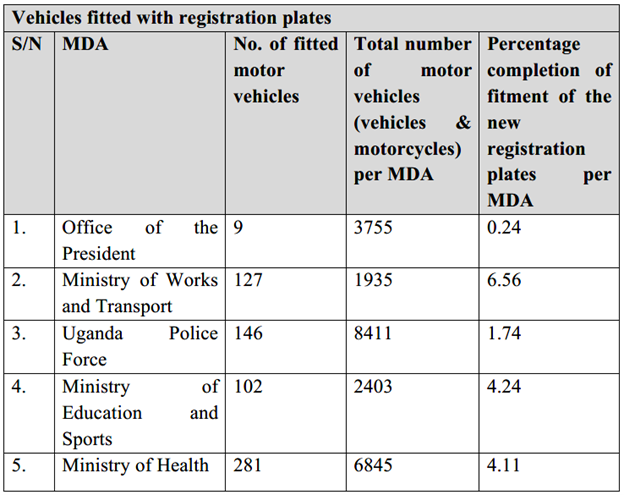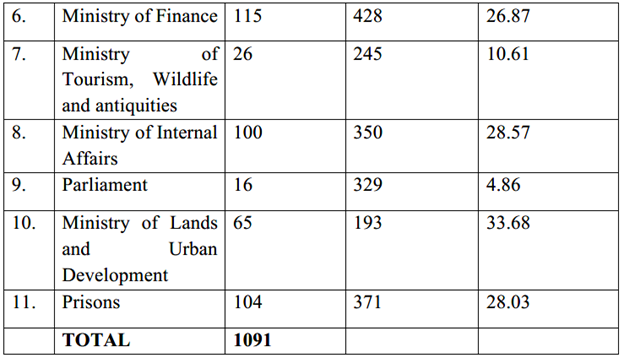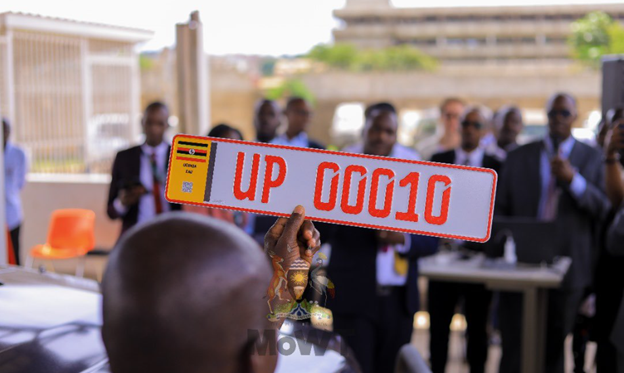Uganda has launched the Intelligent Transport Monitoring System (ITMS) in order to improve security and traffic management. The project was announced by the Minister for Security, Maj Gen Jim Muhwezi and the Minister for Works and Transport, General Edward Katumba Wamala at a press conference held at the Uganda Media Centre on July 4, 2024.
The ITMS project aims to tackle the challenges posed by the rapid increase in motor vehicle ownership in Uganda, which has now surpassed 2.1 million vehicles as of July 2024. These challenges include criminal activities involving motor vehicles, road traffic accidents, multiple number plates, and forgeries.
In partnership with Global Security, the government has introduced the ITMS, a state-of-the-art technology that is designed to swiftly identify vehicles involved in criminal activities and improve traffic management through efficient ticketing and revenue collection.
The ITMS is expected to address various challenges related to the management and administration of motor vehicles, such as the lack of a credible and reliable database, poor quality control measures, insufficient technical staff, distorted reporting structures, low revenue collection, and discrepancies in registration books.
The implementation of the ITMS is a significant advancement in improving security and traffic management in Uganda, and the government is dedicated to ensuring its successful rollout.
Full press release.
INTRODUCTION
Over the years, motor vehicle ownership in Uganda has risen to about two million one hundred and forty five nine hundred and eight eight. (2,145,988m) vehicles as of 3rd July 2024.
This growth has been coupled with an increase in associated challenges such as crime involving the use of motor vehicles, road traffic accidents, multiple number plates and forgeries.
Tracking down criminals and bringing traffic offenders to justice has substantially been bogged down due to lack of sufficient evidence regarding motor vehicles used to execute these crimes.
Similarly, the management and administration of motor vehicles has over the years faced challenges of lack of a credible and reliable database, poor quality control measures, lack of technical staff in the motor vehicle processes, distorted
reporting structures, low revenue collection and discrepancies in in registration books.
Despite various interventions, these problems persist. While some of these challenges have been mitigated with system improvements, many are expected to be addressed through the implementation of the Intelligent Transport Monitoring
System.
The Government of Uganda partnered with Joint Stock Company “Global Security”, to deliver the Intelligent Transport Monitoring System (ITMS),.
Objectives of the ITMS
1. 1. ease recognition of vehicles used by criminals to carry out crimes in the Country to enable quick and timely response by the Security Agencies
2. Traffic Management
1. Enhance revenue collection through the issuance of traffic tickets to traffic
offenders
Implementation of the ITMS project has several components including issuance of digital registration plates . The new registration plates depart from the ones being issued currently . They bear the under listed components;
It’s important to note that a full installation kit comprises the following components:
1) Two aluminium Registration plates for the front and the back
2) A Tracker
3) A Sim-chip
4) Two Blue tooth beacons for both front and back
5) Snap locks for both front and back.
The new solution provides for tracking of all vehicles in real-time on the ITMS Platform at the Police Command Centers of Naguru and Nateete to allow the Government of Uganda trace and resolve vehicle criminals/traffic offenders as
and when required.
It has been 2 years and 10 months since an agreement was signed between the Government and Joint Stock Global Security Company to deliver the project.
The roll-out of the project was supposed to be 1st March 2024 but it was postponed to 01st July 2024, due to logistical challenges.
Towards the roll out date of the project on 01st July 2023, the business community led by KACITA petitioned Parliament to halt the exercise citing lack of enough public sensitization and readiness of the public, and also proposed that the
exercise begin with fitment of registration plates on government vehicles.
Given the above, and coupled with logistical issues on the side of the service provider partly caused by the ongoing war between Russia and Ukraine, an extension was made to 01st November 2023, starting with the fitment of new registration plates to Government Vehicles.
STATUS ON FITTMENT OF REGISTRATION PLATES ON GOVERNMENT VEHICLES.
By 26th June 2024, a total of one thousand and ninety-one (1091) vehicles from various ministries had been fitted with the new registration plates falling short of the required numbers due to persistent logistical challenges which are slowly
being resolved.


Currently at the facility are one hundred seven thousand, and fourteen (107,014) registration plates along with three thousand six hundred sixty-two trackers (3,662), and seventeen thousand six hundred seventy-nine (17,679) BLE beacons,
with more components expected in the country in the next few weeks.
As plans for establishment of a factory materialise, the service provider as guided by the government has set up a facility at Kawempe for local production of registration plates and has installed four hot stamping machines, four embossment
machines, and will soon receive blank plates and hot stomping materials with security features.
The motor vehicle registration system on ITMS which includes the booking system, the verification system and the stock control system is substantially completed.
Improvements on the ASYCUDA and E-Tax to facilitate the pre- registration processes of vehicles at the ports of Mombasa and Dar es salaam and in bonds are also substantially completed.
The provision to facilitate assessment for payment of fees for the new registration plates by Government entities is also completed and is currently available for use by MDAs.
Construction of fitment centers at Mutukula and Malaba border points is also ongoing. `Therefore, as government and the service provider conclude putting in place all the requirements for massive roll-out, we will continue rolling out in phases as follows:
1st November 2024 government will start issuing registration plates to new motorcycles.
6th January 2025, full roll-out of all categories of vehicles and motorcycles.

